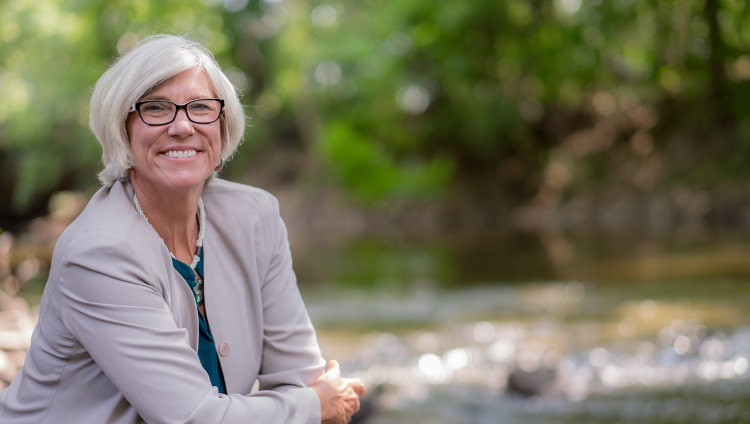Dr. Joan Rose – winner of the 2016 Stockholm Water Prize – is an international expert in water microbiology, water quality and public health safety at Michigan State University. Professor Rose and her team, whom she calls “water detectives,” investigate waterborne disease outbreaks globally to determine how they can be stopped, and prevented.
As part of the Water Institute’s WaterTalks lecture series, Professor Rose will be at Waterloo on March 30, presenting “Monitoring Pathogen Concentrations in Sewage to Inform Treatment Goals and Public Health Risks." This talk will examine treatment performance under typical and high flow conditions, new risk assessment and microbial methods, and the development of protective, science-based public health criteria.
The Water Institute had the opportunity to speak with Professor Rose on these topics and more.

What
are
you
working
on
right
now?
I
am
working
in
four
areas.
The
first
is
using
third
generation
sequencing
to
explore
the
water
environment.
The
second
is
large-scale
surveillance
for
source
tracking
markers
and
pathogens.
The
third
is
removal
of
viral
and
protozoan
pathogens
by
wastewater
treatment
and
the
fourth
is
quantitative
microbial
risk
assessment.
How
do
you
see
your
research
being
applied
in
the
future?
I
am
hoping
that
we
will
move
into
a
future
where
“water
diagnostic”
methods
are
used
around
the
world
to
determine
the
status
of
the
health
of
the
water
environment.
With
this
knowledge,
better
choices
will
be
made
to
treat
polluted
flows.
What
are
the
challenges
that
lie
ahead
in
your
area
of
research?
Monitoring
is
very
expensive
so
we
need
to
find
a
way
to
use
the
data
we
have
and
models
to
examine
spatial
and
temporal
water
quality
degradation.
If
we
don’t
do
this,
I
fear
for
the
biohealth
of
our
planet.
Can
you
talk
about
some
of
the
challenges
you’ve
experienced,
or
that
lie
ahead,
in
your
research
about
the
City
of
Toledo Bayview
Water
Reclaimation
Plant
Pathogen
Study?
Here
the
City
has
put
into
place
innovative
High
Rate
Clarification
to
treat
high
flows
(wastewater
and
stormwater).
While
setting
up
this
pathogen
study
was
a
challenge
for
all
of
us
at
the
facility
and
in
the
lab,
by
working
together
we
are
developing
one
of
the
best
data
sets
demonstrating
not
only
the
technology
but
the
optimization
of
the
processes
to
be
assured
we
are
controlling
pathogens
What
made
you
decide
to
start the
Rose
Labs
at
Michigan
State
University?
I
have
always
run
a
water
quality
laboratory
as
a
part
of
setting
up
a
research
program.
But
here
at
Michigan
State
University,
I
had
the
opportunity
to
develop
an
advanced
technologies
testing
program.
We
were
also
able
to
train
students
and,
more
importantly,
we
have
helped
to
develop
a
network
of
water
diagnostic
laboratories
throughout
the
state.
What’s
next
for
your
research?
We
are
developing
field-based
and
rapid
testing
programs
using
hand-held
genomics,
so
that
is
very
exciting.
Through
the
Global
Water
Pathogens
Project
(GWPP)
we
hope
to
produce
maps
that
can
show
the
risk
of
waterborne
disease
for
numerous
pathogens.
You
are
a
successful
female
scientist
and
innovator.
How
can
we
encourage
more
women
to
get
involved
in
STEM
(science,
technology,
engineering
and
math)
subjects?
Well,
I
try
to
lead
by
example
and
make
myself
accessible
to
women
groups
as
well
as
individuals.
We
must
continue
to
have
conversations
about
how
we
encourage
young
girls
and
young
women
to
try
the
STEM
professions.
It
is
not
something
we
can
say
ok
we
“fixed”
that
problem.
It
must
be
part
of
our
on-
going
programs.
We
need
to
show
examples
of
successful
women
scientists,
not
so
much
their
accomplishments,
but
their
struggles
and
their
pathway.
Everyone
has
challenges
and
demonstrating
that
shows
others
that
you
can
do
it
too.
I
want
women
to
know
that
there
is
a
network
out
there
a
community
they
can
be
part
of.
Professor Joan Rose will be delivering her talk on March 30, 2017 in the Science Teaching Complex (STC), Room 1012 at 2:30 p.m.
Reserve your spot to hear her speak.